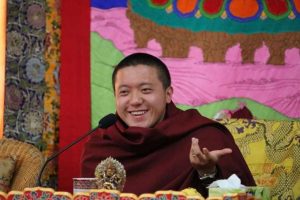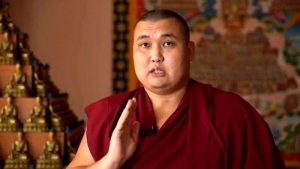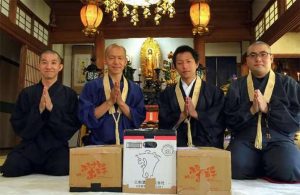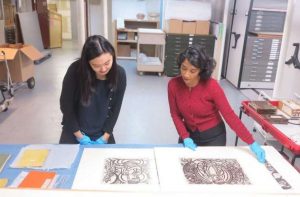
Coinciding with “Moon Festival” on 17 September, a mid-autumn celebration observed across East Asia, The Kumarajiva Project, a translation initiative of Khyentse Foundation, hosted a live-streamed event that marked the launch of a new free online resource initiated by Dzongsar Khyentse Rinpoche titled Creative Resilience, and aimed at offering “a toolkit happiness, mental well-being, and resilience during stressful and emotionally challenging times.” (Creative Resilience)
“Through the lens of the five elements [space, wind, water, earth, and fire], this project offers creative and unique psychological tools to help individuals master their own mind and transform emotional challenges into the joy of awareness,” The Kumarajiva Project announced.
Launched by the Khyentse Foundation in the summer of 2019, The Kumarajiva Project (圓滿法藏-佛典漢譯計畫) is an ambitious undertaking to translate canonical Buddhist texts from Tibetan into Chinese, aiming to complete the translation of the Tibetan Buddhist canon—both the Kangyur (the translated words of the Buddha) and the Tengyur (the translated commentaries on the teachings)—into Chinese within 60 years.*
“As The Kumarajiva Project aspires to translate canonical Buddhist texts into Chinese and ignite passion for Buddhist wisdom, it hopes to collaborate with initiatives like Creative Resilience to bring the wisdom contained in these texts into our daily life.” (The Kumarajiva Project)
During the online event, which was hosted in collaboration with Siddhartha’s Intent International, Dzongsar Khyentse Rinpoche conferred the Bodhisattva Vow on live-stream participants from Bhutan, noting:
“I’m sure under this very moon, billions and billions of countless bodhisattvas of the past have taken the Bodhisattva Vow. And I’m sure countless future bodhisattvas will take the Bodhisattva Vow under this very same moon. . . . Vow is like a direction. Vow is like a premise. But a vow is also like the key to freedom.
“As human beings, [we need direction;] we need a premise; we need a ground. We need these because we are always going through what the Buddhists call duhkha . . . [and while we can sometimes experience fun or a festive, celebrative mood], after a while none of this lasts. And even while it’s happening, it’s never 100 per cent perfect. . . . And so there’s . . . a constant [feeling of] insecurity. And because of this insecurity, we jump to quick conclusions, trying to fix things, trying to apply all kinds of remedies. And many times these remedies or solutions themselves end up becoming some sort of a problem. So I think that having a right premise, right ground, right foundation, right direction is so important.
“If you think about it, there’s no greater, more sober, more non-deceiving, non-delusional, premise, foundation, or direction than the Way of the Bodhisattva: the bodhisattva’s way of thinking; the bodhisattva’s way of looking at things; the bodhisattva’s way of dwelling with the bodhisattva’s way of looking at things. And this is why I would say that there’s no greater value than the vow of the bodhisattva.”
Following Rinpoche’s discourse, two of the key people involved in manifesting the Creative Resilience project, American psychologist Sandra Scales, and Deepa Thakur, director of The Khyentse Foundation India non-profit organization, introduced the new well-being initiative and resource.
On the new website, the team of instructors and artists who have manifested the project explain:
CreativityandResilience.org came about due to the unusual challenges recent years have brought for people across the planet,” the team of instructors and artists who have manifested the project explained. “With the idea that difficult times demand fresh and evolving resources, teacher, solution-builder, and filmmaker Dzongsar Khyentse Rinpoche, aka Khyentse Norbu, tasked a team with the development of this site. An international group of psychologists, writers, teachers, and artists have worked on creating a platform that offers a suite of flexible tools to bolster our own innate creativity and resilience and also to transform difficulties in a truly unique way. (Creative Resilience)

Born in Bhutan in 1961, Dzongsar Khyentse Rinpoche is the son of Thinley Norbu Rinpoche and was a close student of the Nyingma master Dilgo Khyentse Rinpoche (1910–91). He is recognized as the third incarnation of the 19th century Tibetan terton Jamyang Khyentse Wangpo (1820–1892), founder of the Khyentse lineage, and the immediate incarnation of Jamyang Khyentse Chökyi Lodrö (1893–1959).
Rinpoche’s projects and initiatives include: Khyentse Foundation, established in 2001 to promote the Buddha’s teaching and support all traditions of Buddhist study and practice; Siddhartha’s Intent, an international collective of Buddhist groups supporting Rinpoche’s Buddhadharma activities by organizing teachings and retreats, distributing and archiving recorded teachings, and transcribing, editing, and translating manuscripts and practice texts; 84000, a non-profit global initiative to translate the words of the Buddha and make them available to all; Lotus Outreach, which directs a range of projects to ensure the education, health, and safety of vulnerable women and children in the developing world; and Lhomon Society, which promotes sustainable development in Bhutan through education.
Rinpoche is the author of several books, including: What Makes You Not a Buddhist (2006), Not For Happiness (2012), The Guru Drinks Bourbon? (2016), and Poison is Medicine: Clarifying the Vajrayana (2021), and has garnered renown inside and outside of the global Buddhist community for the feature-length films he has written and directed: The Cup (1999), Travellers and Magicians (2004), Vara: A Blessing (2012), Hema Hema: Sing Me a Song While I Wait (2016), and Looking For A Lady with Fangs and a Moustache (2019).
* Khyentse Foundation Plans Ambitious Undertaking to Translate Tibetan Buddhist Canon into Chinese (BDG); Khyentse Foundation’s Kumarajiva Project Marks 2nd Year with 7 Buddhist Texts Translated into Chinese (BDG); and Khyentse Foundation’s Kumarajiva Project Shifts Focus to Training Translators (BDG)
See more
The Kumarajiva Project
Siddhartha’s Intent
The Kumarajiva Project
84000
Lotus Outreach
Khyentse Foundation
Related news reports from BDG
84000 Launches New Community for Supporters of its Dharma-Translation Mission
Khyentse Foundation Announces Appointment of Dr. Jörg Heimbel as Professor of Tibetan and Buddhist Studies at Ludwig Maximilian University of Munich
Buddha Smiles: Lotus Outreach Marks 12 Years of Partnership to Educate Vulnerable Children in Tamil Nadu
Online Dharma: Khyentse Foundation Announces the Launch of Revamped Website
Less Meat More Love! Khyentse Foundation Announces New Book for Children
















